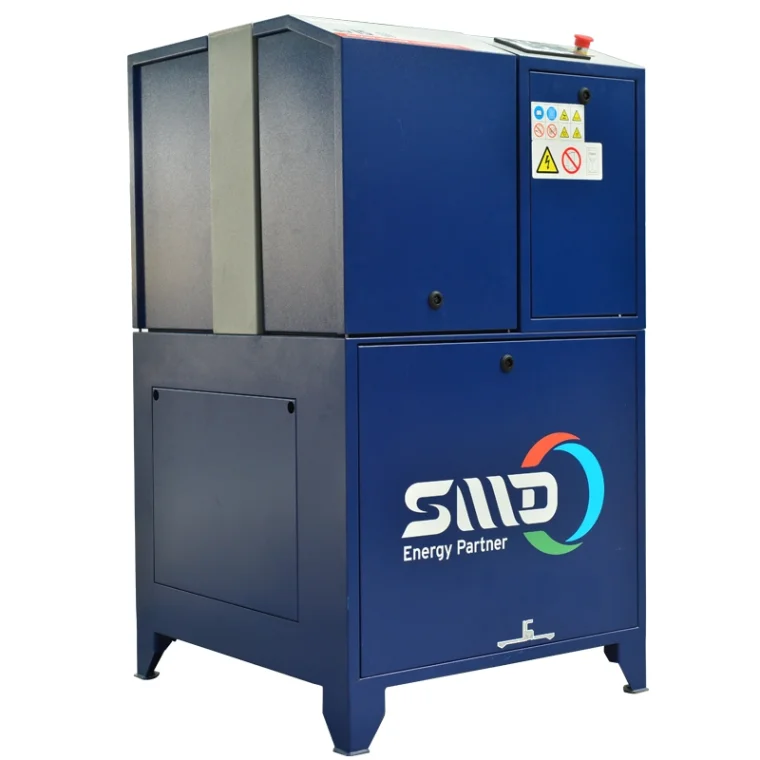Compressed air is the lifeblood of many industrial operations, powering tools, machinery, and critical processes across manufacturing, chemical, and food industries. When it comes to selecting the ideal screw compressor, one of the first questions businesses face is: oil-injected or oil-free? Each type offers distinct advantages and considerations depending on the application, efficiency requirements, and operational environment.
SMEATON Fluid Machinery (Shanghai) Co., Ltd. specializes in providing high-performance fluid machinery solutions, including oil-injected screw compressors, oil-free screw compressors, centrifugal compressors, screw and centrifugal blowers, and vacuum pumps/systems. Their extensive expertise ensures that clients receive the right solution tailored to their operational needs, energy efficiency goals, and system requirements.

1. Understanding Oil-Injected Screw Compressors
Oil-injected screw compressors, also known as oil-lubricated compressors, inject a small amount of oil into the compression chamber to lubricate, seal, and cool the system. Key benefits include:
-
High efficiency and durability: Oil reduces friction and wear on rotor surfaces, extending compressor life.
-
Lower operating temperatures: Effective cooling prevents overheating during continuous operation.
-
Cost-effective performance: Typically lower initial costs compared to oil-free units.
However, oil-injected compressors require oil separation and filtration systems, and the compressed air may need additional treatment for applications sensitive to oil contamination.
Applications: heavy-duty manufacturing, metalworking, automotive assembly, and general industrial operations where minor oil traces are acceptable.
2. Understanding Oil-Free Screw Compressors
Oil-free screw compressors operate without any lubrication in the compression chamber, delivering 100% clean air. This design is crucial when air purity is non-negotiable.
Key benefits include:
-
Contamination-free air: Ideal for food and beverage, pharmaceutical, electronics, and medical applications.
-
Simplified maintenance in terms of oil management: No need for oil changes or disposal.
-
Compliance with strict regulatory standards: Ensures adherence to hygiene and quality control requirements.
However, oil-free compressors usually involve higher upfront costs and may have slightly higher energy consumption compared to oil-injected models.
Applications: cleanroom environments, pharmaceutical manufacturing, food processing, and sensitive electronics production.
3. Energy Efficiency and Operational Considerations
Energy efficiency is a major factor in long-term operational costs. Oil-injected compressors tend to have slightly better energy efficiency due to reduced friction in the compression chamber. On the other hand, SMEATON provides customized energy optimization solutions, such as:
-
Heat recovery systems that capture waste heat from compressors for facility use
-
Energy efficiency assessments (EEA) to optimize performance and reduce costs
-
Contract energy management (EMC) and air supply contracts (ASC) to manage consumption effectively
These solutions help both oil-injected and oil-free systems operate at peak efficiency, reducing operational costs without compromising performance.
4. Maintenance and Lifecycle Costs
Maintenance requirements differ significantly:
-
Oil-injected compressors: Regular oil changes, filter replacements, and monitoring of oil quality are required. Failure to maintain oil quality can reduce system efficiency and lifespan.
-
Oil-free compressors: Eliminate oil-related maintenance, but may require closer monitoring of rotor wear and temperature management.
SMEATON Fluid Machinery offers support and guidance for both compressor types, ensuring long-term reliability and optimized lifecycle performance.
5. Choosing the Right Compressor for Your Business
When deciding between oil-injected and oil-free screw compressors, consider the following factors:
-
Air purity requirements: Choose oil-free if contamination is unacceptable.
-
Operational environment: High-temperature or continuous-duty applications may benefit from oil-injected models.
-
Budget and total cost of ownership: Factor in maintenance, energy efficiency, and expected lifespan.
-
Industry regulations and compliance: Certain industries mandate oil-free air to meet quality standards.
SMEATON Fluid Machinery (Shanghai) Co., Ltd. works with clients to assess their operational needs and provide tailored solutions, whether it’s an oil-injected system for industrial efficiency or an oil-free system for stringent air quality standards.
Conclusion
Both oil-injected and oil-free screw compressors have their place in modern industry. Oil-injected compressors excel in durability, efficiency, and cost-effectiveness, while oil-free compressors are essential for applications demanding uncontaminated air.
With the guidance and support of experienced providers like SMEATON Fluid Machinery, businesses can make informed decisions, optimize energy use, and ensure reliable, high-quality compressed air for their operations. Selecting the right type ultimately depends on your industry requirements, operational priorities, and long-term goals.
www.smeatoncompressor.com
SMEATON Fluid Machinery (Shanghai) Co., Ltd.